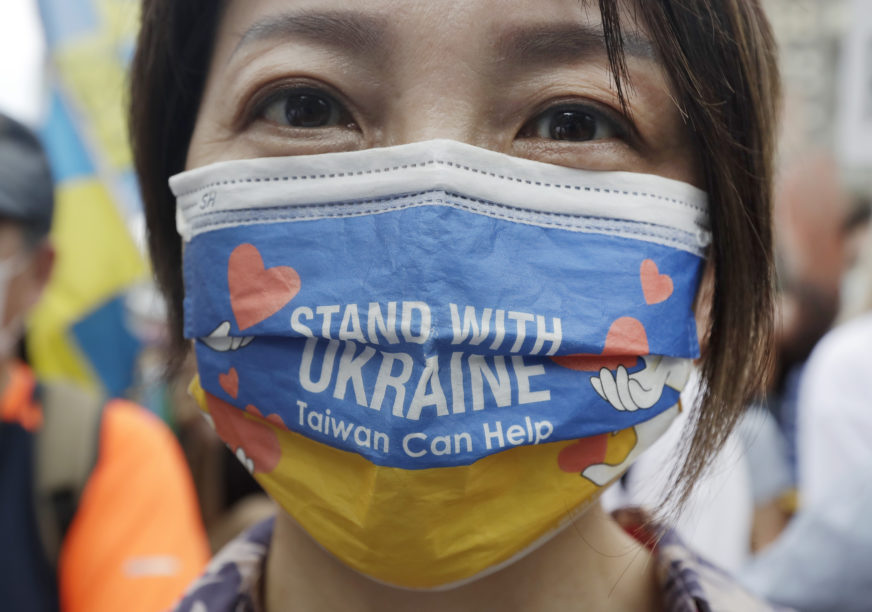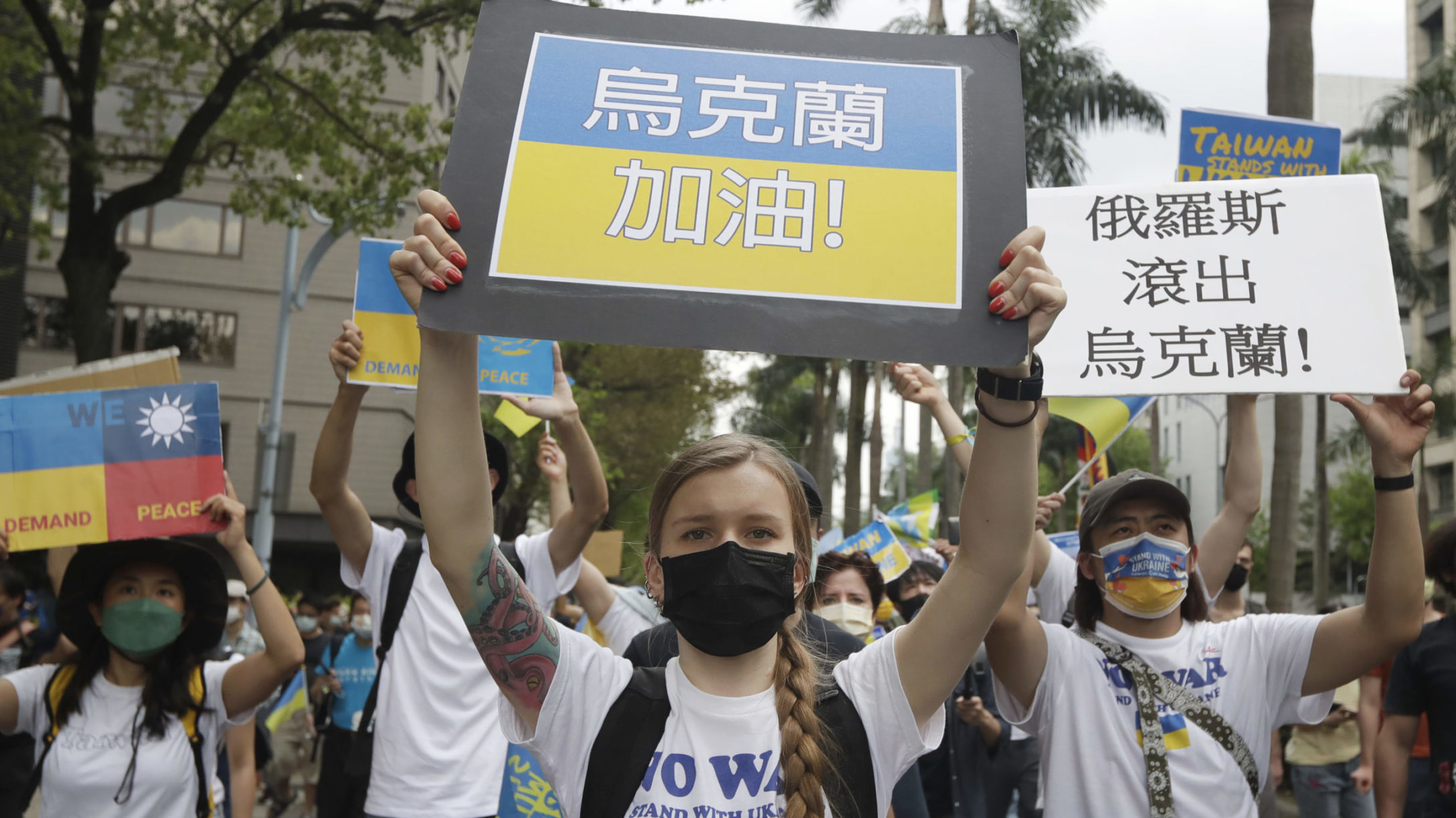Nobody chooses to be born as one nationality or another. I didn’t choose to be Taiwanese and not Chinese, for example, nor did any Ukrainian choose to be born Ukrainian and not Russian.
Still, we have seen all the deaths, all the cities that have been shelled, and many millions of refugees who have been displaced from Ukraine by an invasion driven by the Russian nationalist abstraction. None of this was necessary in the slightest. As I hope we know by now, Russian nationalism is attempting to invalidate the existence of Ukraine itself, and looting or destroying the property, homes and lives of Ukrainians. And this has gone on for around eight weeks now.
How does one get in this headspace, to be willing to kill a group of strangers for their land? How does one become willing to stake one’s own life on the accident of nationality, considering that Russian soldiers are themselves risking being killed in the course of their participation in Russia’s “special military operation” in Ukraine?
I find all this very hard to wrap my head around. But that’s nationalism: It can persuade people that lethal force is necessary for the survival of their own nation-state, a community determined at random by the mere fact of birth. Or alternatively, nationalism instills a conviction that war is necessary for the realization of some greater good, some mission of destiny. Or again, it can just be the inescapable power of the nation-state that can forcibly compel living, thinking people to participate in conflict against their will, completely indifferent to their true political convictions. Nationalism is built on a series of exclusions, it’s a demand that you define yourself as something, based solely on your not being something else.
It’s strange to have someone bent on killing you for that.

Many in Taiwan have remarked on the commonalities between their country and Ukraine. Both long faced the prospect of invasion by a larger imperial power; Russia for Ukraine, and China for Taiwan.
There are other similarities. There’s no denying Taiwan’s historical and cultural links with China, much as Ukraine and Russia share Slavic roots. Contemporary geopolitical designs call upon ancient history for their justification in both cases, in an attempt to invalidate ever-stronger claims to self-determination. In both places, authoritarians claim that a whole people does not deserve to rule itself because of ancient history.
And there are ideological parallels, as well. As Putin seeks to centralize his power, it doesn’t help to have democracies such as Ukraine on his doorstep. With respect to Taiwan, the Chinese Communist Party has tried to claim that ethnic Chinese are not suited for democracy, though Taiwan’s flourishing democracy obviously gives that claim the lie. Allowing people to control their own destinies is anathema to autocrats, whether Putin or Xi.
In Taipei there have been solidarity rallies for Ukraine, sometimes almost daily, outside Moscow’s representative office here. Taiwanese donated more than 700 million NT to Ukraine in less than twenty days, along with tons of medical and other supplies. Taiwan has a tendency to act on global issues that it sees as a proxy for its own situation; there was similar mobilization, for example, during the 2019 protests in Hong Kong. I went over myself, in fact, in order to report from there.
The global impact of the invasion of Ukraine will affect everyone, including Taiwan. Where does eventually China fit into this crisis? There’s been a debate about whether China was aware of Putin’s plans for an invasion ahead of time, or could even have agreed to it. Certainly, since the invasion of Ukraine many countries have called on China to use its influence to pressure Russia. But China has generally drifted closer into alignment with Russia, so far. It is likely that the deep antagonism that already existed between the US and China will be worsened as an indirect result of this realignment.
Either way, China has sought to use the Ukraine crisis to intimidate Taiwan, suggesting that resistance is futile and Taiwan could potentially meet the same fate. Chinese military threats directed at Taiwan have continued since the invasion began. China has also seemingly tried to use Taiwan as a bargaining chip at times, attempting to persuade the US to accommodate its claims over Taiwan in return for possibly taking actions vis-à-vis Russia.
I have to admit, I’ve been finding it difficult to sleep since the start of the war in Europe. Too much time glued to social media, watching news developments as they occur in real time. Sometimes when I’m about to fall asleep, I think about how someone at the moment is probably dying in a war zone.
Not that wasn’t the case before the invasion of Ukraine, in many places across the world. Just the world looks like it’s on the precipice these days.
Though the prospect of nuclear war between the US and Russia is far from the table, the thought that Russia might use nuclear weapons in Ukraine—even on a limited basis—is a frightening one. The occasional threat by North Korea notwithstanding, it’s been a long time since this kind of thing was in the realm of possibility.
The thought of earthshaking events happening in the absence of any way to intervene is unendurable. I’m not even part of the global discourse on that part of the world, the way I am for discussion of Taiwan in the English-language world.
And sometimes I think it’s best to shut up and just listen, which in this case means listening to Ukrainians rather than those who talk about Ukraine as it were simply just a chess piece on a strategic table—and there’s been a lot of that, with media discussion of Ukraine frequently cast in terms of US and Russian interests, but not in terms of what Ukrainians want, for themselves. To be left alone and in peace, I imagine. Unfortunately, whenever Taiwan is in the international news, in the same vein, I’ll see a bunch of uninformed commentators—sometimes even individuals who write for large international publications—who have no expertise on Taiwan at all, jumping in with their hot takes. This can actually be dangerous to Taiwan, if ideas that have no basis in reality can spread widely enough to gain traction.
Yet that hardly matters to those trying to build their own influence. And I see this, too, with some of the commentary on Ukraine. Grifters are a dime a dozen.
For a long time after the end of the Cold War, much of the world labored under the illusion that we were living in “post-history,” when for longer than we can remember, humans have been killing each other for land. Sometimes it’s about the land itself, in terms of material resources. Other times, it’s about control of the people there, to deny them their freedoms and invalidate their right to self-determination. Or it’s about annihilating that people, to deny them the right to exist altogether. Plus ça change. Still, it’s contingent on those of us who live today, bearing the weight of the past as best we can, to try and to try and find a way out; to solve the riddle that is history.






